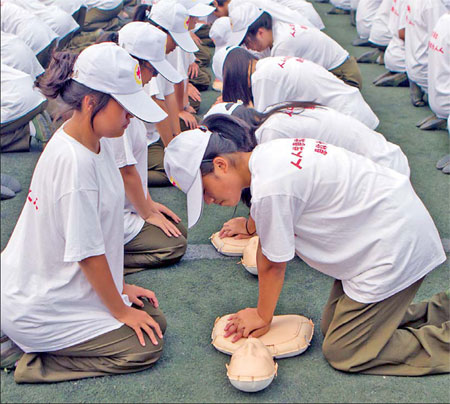Society
Guidelines warn against hasty help
Updated: 2011-09-08 07:37
By An Baijie (China Daily)
BEIJING - A just-released guideline on how to help elderly people who have fallen down is not connected with a series of recent cases where people have gone unassisted, said a Ministry of Health official.
 |
|
Members of emergency rescue teams under the Red Cross Society of China perform a first-aid drill in Beijing on Wednesday. [Photo/ China Daily] |
Yan Jun, a division director of the ministry's disease prevention and control bureau, told China Daily that planning for the guideline was started two years ago.
"The guideline just explains how to deliver assistance in a scientifically proper way," she said.
Xin Baoshan, director of the Chinese Red Cross National Training Center, which specializes in emergency training, said helping up an elderly person in an inappropriate way can cause further injuries.
"The public should know that kind intentions won't necessarily lead to good outcomes, particularly in emergency response and first aid," he said at an awareness event on Wednesday to mark World First Aid Day, which falls on Sept 10.
The 41-page guidebook issued on Tuesday elaborates risks that might cause the elderly to fall over and how to help them at home and on the street.
It outlines four steps to take before lending a hand: evaluating the person's physical condition, determining the cause of the accident, finding potential risks such as being close to a staircase, and making a plan for rescue workers.
"Don't rush to lend a hand to the elderly after seeing them fall over. It should be handled by different measures in different situations," the document said.
The guideline comes amid a rising number of cases in which elderly people who fell were not helped up.
On Friday, an 88-year-old man in Hubei province collapsed face-first on the ground and lay helplessly in a crowd for about 90 minutes until his son and wife arrived. They sent him to hospital but he died from suffocation caused by a nosebleed blocking his airway.
The ministry said the new guidelines have nothing to do with morality and ethics. "We don't doubt the morality of the Chinese public to lend a hand to elderly people who have fallen down," Yan said.
Together with the guideline on the elderly, three other guidelines involving children, drowning and traffic accidents were also issued on Tuesday.
Currently, only one percent of the Chinese public has received correct emergency training.
Some people, however, have other reasons to fear assisting people who have fallen.
On Aug 26, a bus driver helped an 81-year-old woman who had fallen over on an overpass in Rugao, Jiangsu province. The woman later called police and claimed the driver had run her over. Police checked the video on the bus and found the woman was not telling the truth.
Tan Fang, a professor at South China Normal University, set up a foundation in March to deal with the risks of helping the elderly in difficult situations. It provided both financial and legal aid to those who had gotten into trouble for helping the elderly.
Tan said the ministry's guideline would not be enough to encourage the public to help the elderly, since it did not provide ethical and legal support to those who might be sued after helping out.
"The problem does not lie in rescue techniques, but in social ethics and legislation," Tan said.
E-paper

Unveiling hidden treasures
The Forbidden City, after the Great Wall, is the most recognized tourist site in China.
Short and sweet
Game for growth
Character reference
Specials

China at her fingertips
Veteran US-China relations expert says bilateral ties have withstood the test of time

The myth buster
An outsider's look at china's leaders is updated and expanded

China in vogue
How Country captured the fascination of the world's most powerful fashion player
